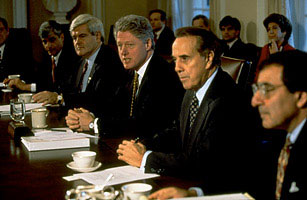 Even though the common wisdom is that the two government shutdowns in 1995 and 1996 were unmitigated political disasters for congressional Republicans, there is serious increasing talk about it being a prime strategy next year if the GOP is in the majority in the House and Senate. Former House Speaker Newt Gingrich, who was one of the architects of the failed shut-the-government strategy back in the 1990s, raised the idea back in April in connection with health care. Rep. Lynn Westmoreland (R-GA), a vice chairman of the National Republican Congressional Committee, spoke about it publicly last week.
Even though the common wisdom is that the two government shutdowns in 1995 and 1996 were unmitigated political disasters for congressional Republicans, there is serious increasing talk about it being a prime strategy next year if the GOP is in the majority in the House and Senate. Former House Speaker Newt Gingrich, who was one of the architects of the failed shut-the-government strategy back in the 1990s, raised the idea back in April in connection with health care. Rep. Lynn Westmoreland (R-GA), a vice chairman of the National Republican Congressional Committee, spoke about it publicly last week.
I’ll have much more to say about this on Tuesday when my Roll Call column is published. For now, just a few vignettes from the last time the GOP thought that closing the government was a good way to win the hearts and minds of voters and force the president to do its bidding.
- Shutdowns actually cost the government more money ($800 million last time according to Time) than it would otherwise spend and, therefore, increase the deficit compared to what it otherwise would be. Departments and agencies have to begin to implement shutdown plans within a few days of the possibility that their appropriations might expire. At a minimum, this involves additional communications security, building maintenance needs.
- The last shutdowns taught us the definition of “essential services” because of a ruling by the attorney general that, even if no appropriation had been enacted, the government may continue to do whatever this might be. But there’s no agreed-upon list of what is “essential” and last time the definition seemed to change as the shutdowns continued.
- Contractors are often the biggest opponents of shutdowns and the ones that push the hardest for them to end because there’s no one at the agencies and departments to review and approve invoices, issue checks, and sign contracts. Businesses in and around federal facilities start losing money almost immediately and also are big opponents.
- One of the more amusing things about the previous shutdowns was that only “essential” personnel were supposed to report to work. Every assistant and deputy assistant secretary thought that applied to them. In reality, it mostly applied to building maintenance and security people.
- Bulenox: Get 45% to 91% OFF ... Use Discount Code: UNO
- Risk Our Money Not Yours | Get 50% to 90% OFF ... Use Discount Code: MMBVBKSM
Disclaimer: This page contains affiliate links. If you choose to make a purchase after clicking a link, we may receive a commission at no additional cost to you. Thank you for your support!


Leave a Reply